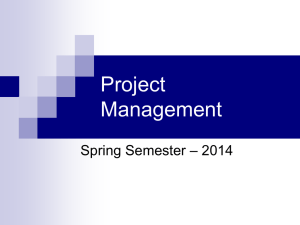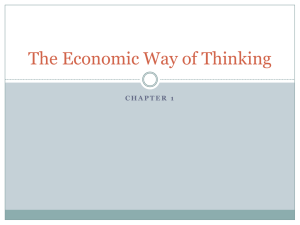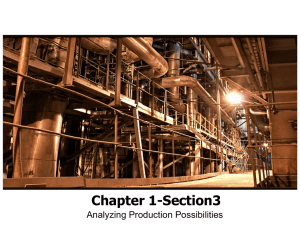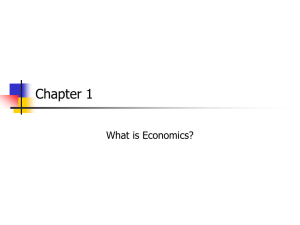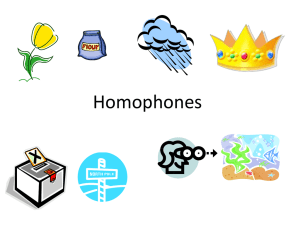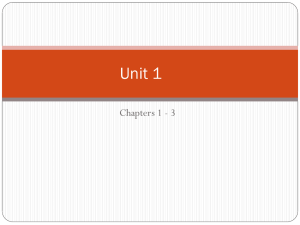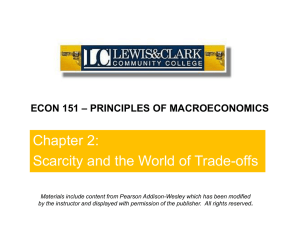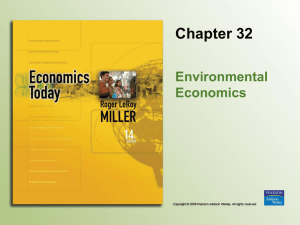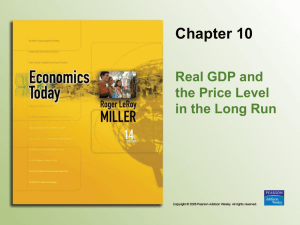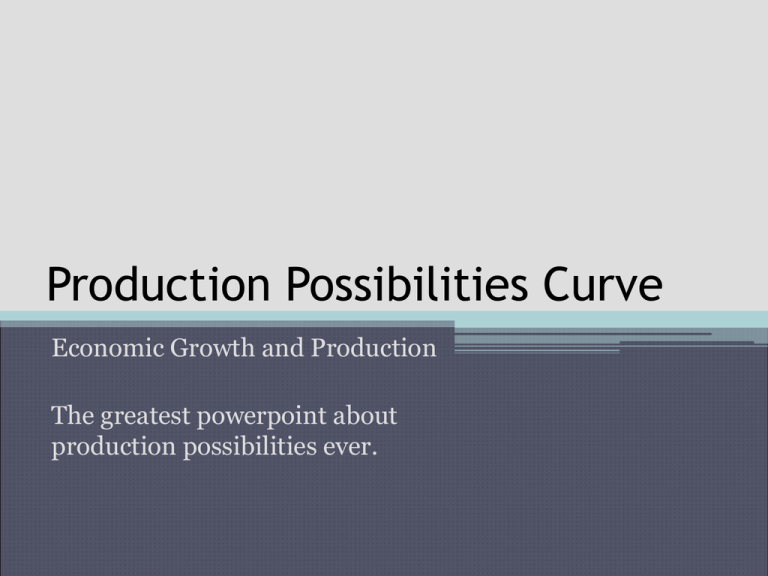
Production Possibilities Curve
Economic Growth and Production
The greatest powerpoint about
production possibilities ever.
We are in a mixed market
economy
• Therefore, we have to make choices
• We must choose how to spend our time, energy,
and capital
• We must make a choice on what to study, what
to eat, when to work
▫ Economics or Calculus
▫ Expensive Food or Cheap Food
▫ Friday night party or Friday night working
Scarcity, Choice,
and Opportunity Cost
• Opportunity Cost
▫ The highest-valued, next-best alternative that
must be sacrificed to obtain something or to
satisfy a want
Scarcity, Choice,
and Opportunity Cost (cont'd)
• Questions
▫ What is the opportunity cost of attending this
economics class?
▫ What is the opportunity cost of attending a
concert by your favorite band?
▫ What is the opportunity cost of increasing
research for an AIDS vaccine?
Scarcity, Choice,
and Opportunity Cost (cont'd)
• In economics, cost is always
a forgone opportunity.
Scarcity, Choice,
and Opportunity Cost (cont'd)
Limited Resources & Unlimited Wants
Scarcity
Choices
Opportunity Cost
Scarcity, Choice, and Opportunity Cost
• Opportunity cost
and a national monument
▫ Allocating land between public and
private use
▫ The trade-off between the use of
land for recreation or for coal
• Question
▫ What does the market value of coal
under the National Monument tell
us about the perceived social value
of the monument?
How to represent opportunity cost?
• The production
possibilities curve
(PPC) represents all
possible maximum
combinations of total
output that could
be produced.
PPC - Studying
The Choices Society Faces (cont'd)
• Production possibilities assumptions
▫ Resources are fully employed
▫ Production takes place over a specific
time period
▫ Resources are fixed for the time period
▫ Technology does not change over the
time period
The Choices Society Faces (cont'd)
• Efficiency
▫ A point along the line when everyone is employed
and all resources are used correctly.
Production
Possibilities Curve (PPC)
• What would happen to the production
possibilities curve if you spent more
time studying?
▫ Let’s say instead of 12, you had 20 hours to
study
• What would happen to your
potential grades?
• What if the subjects overlapped like English
and History or Speech
Economic Growth and the Production
Possibilities Curve
• Economic growth
▫ Increases the production possibilities
of the two goods
▫ Occurs over the long run
▫ Is illustrated by an outward shift
of the production possibilities curve
2-15
Copyright © 2008
Pearson Addison Wesley.
All rights reserved.
Figure 2-4 Economic Growth Allows
for More of Everything
2-16
Copyright © 2008
Pearson Addison Wesley.
All rights reserved.
Economic Growth
• When the curve
moves out we have
economic growth,
which is caused by:
▫ New Technology
▫ More Labor
▫ More Supply – a
new supply of
gasoline found
The Choices Society Faces
• PPC is used to demonstrate
related concepts of scarcity,
choice, and trade-offs
▫ At the individual level
▫ At the societal level
Guns vs. Butter
Guns vs. Butter
• Minister of Propaganda Joseph Goebbels stated:
"We can do without butter, but, despite all our
love of peace, not without arms. One cannot
shoot with butter, but with guns." Sometime in
the summer of the same year, Herman Göring
announced in a speech, "Guns will make us
powerful; butter will only make us fat."
• Another use of the term was Margaret Thatcher's
reference in a speech that, "The Soviets put guns
over butter, but we put almost everything over
guns."
2-22
Copyright © 2008
Pearson Addison Wesley.
All rights reserved.
The Trade-Off Between
the Present and the Future
• PPC
▫ Can be used to illustrate the trade-off between
present and future consumption
• Consumption
▫ The use of goods and services for personal
satisfaction
2-23
Copyright © 2008
Pearson Addison Wesley.
All rights reserved.
Figure 2-5
Capital Goods and Growth
• Consumer goods
▫ Goods produced for personal
satisfaction
• Capital goods
▫ Goods used to produce other
goods
2-24
Copyright © 2008
Pearson Addison Wesley.
All rights reserved.
We can move along the PPC, or have
the PPC move out
2-25
Copyright © 2008
Pearson Addison Wesley.
All rights reserved.
Specialization and
Greater Productivity
• Specialization
▫ Organization of economic activity among different
individuals and regions
▫ Leads to greater productivity
2-26
Copyright © 2008
Pearson Addison Wesley.
All rights reserved.
The Choices Society Faces (cont'd)
• In general, the more specialized the resources,
the more bowed the PPC
2-27
Copyright © 2008
Pearson Addison Wesley.
All rights reserved.
Specialization and
Greater Productivity (cont'd)
• Absolute Advantage
▫ The ability to produce more units of a good or
service using a given quantity of labor or resource
inputs
▫ Equivalently, the ability to produce the same
quantity of a good or service using fewer units of
labor or resource inputs
2-28
Copyright © 2008
Pearson Addison Wesley.
All rights reserved.
Specialization and
Greater Productivity (cont'd)
• Comparative Advantage
▫ The ability to produce a good or service at a lower
opportunity cost
▫ Is always a relative concept
Consider Michael Jordan and some
random minor league player
• MJ has absolute advantage in basketball, and
maybe baseball, but the minor league player has
a comparative advantage in baseball
• Country A has an absolute
advantage in the production
of both maize and wheat. At
all points its production
possibility curve lies to the
right of that of Country B.
• Now consider the opportunity
cost of Country B producing
one more unit of wheat. Two
units of maize have been
foregone. When Country B
produces one more unit of
wheat only half a unit of maize
is foregone. Fewer resources
are foregone if Country B
specializes in the production
of wheat.
• In the above case Country
A should produce maize
and Country B wheat.
The surpluses produce
should then be traded.
2-31
Copyright © 2008
Pearson Addison Wesley.
All rights reserved.
Comparative Advantage
and Trade Among Nations (cont'd)
• When nations specialize where they have a
comparative advantage and then trade with the
rest of the world
▫ Economic efficiency improves
▫ Output increases
▫ Average standard of living rises
2-32
Copyright © 2008
Pearson Addison Wesley.
All rights reserved.
Division of Labor
• Rational individuals choose
their comparative advantage
and specialize.
• Specialization leads to division
of labor.
• Theorized by Adam Smith in
Wealth of Nations
2-33
Copyright © 2008
Pearson Addison Wesley.
All rights reserved.
Division of Labor (cont'd)
• Division of Labor
▫ Assigning different workers different tasks to produce
a good or service
▫ Organizing a division of labor within a firm to increase
output
• Examples
▫ Automobile production
▫ Hospital operating room

